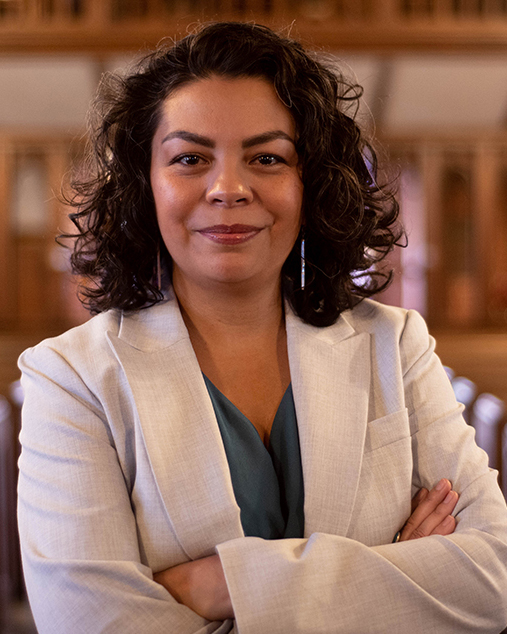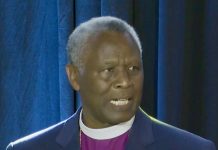August 20. 2033
Dear Deputies,
It is with a heavy heart that I write to share some difficult news with you. Over the last year, I have been the complainant in a Title IV case under the purview of the Disciplinary Board for Bishops.
Until today, to uphold the integrity of the process, I have shared information about this incident and case with very few people, including my family, staff, therapist, and Council of Advice. With the Title IV process having been exhausted as of July 31, 2023, I want you, the House I serve, to hear about this from me as part of my ongoing commitment to transparency.
On July 9th, 2022, shortly after the House of Deputies elected me to serve as your 34th president, I experienced an incident of unwanted and non-consensual physical contact. I was physically overpowered and lost bodily autonomy by a retired bishop waiting for my arrival to greet our colleagues in the House of Bishops. This, along with some accompanying inappropriate verbal statements, compelled me to submit a Title IV complaint via my chancellor to the intake officer in the Office of Pastoral Development. A bishop who witnessed the incident also filed a report to the intake officer within 24 hours after the incident. The retired bishop was placed on restricted ministry under Title IV. As the Title IV case progressed, the executive officer of the General Convention removed the retired bishop from serving on certain governance bodies pursuant to the anti-harassment policies of the Domestic and Foreign Missionary Society.
As the Title IV process evolved over the last 13 months, three reports by two external investigators determined that the retired bishop had likely violated The Episcopal Church’s Title IV canons and New York sexual harassment laws; the third report found that he may have violated the restrictions on his ministry. Despite all the evidence, including three eyewitnesses to the incident, the church attorney assigned to this matter has chosen to refer it for a pastoral response instead of discipline. This referral was made by the church attorney without any explanation. I find this outcome deeply unsettling and feel the referral to be an obvious abuse of discretion by the church attorney.
My motivation for sharing this story stems from a deep love for our church. It is from this place of profound care and concern that I raise important questions about safety and accountability. If the president-elect of our House and deputy chair of the Legislative Committee on Sexual Harassment, Sexual Exploitation, and Safeguarding can experience unsafe treatment right at the door of the House of Bishops during the General Convention, then who in our church can truly be safe? If there is no discipline for well-documented violations, then under what circumstances would discipline be imposed?
Going through the Title IV process this past year was not something I would want anyone to have to endure. Yet, living through that experience has given me an important perspective that I can apply in my leadership role, and it has renewed my long-lasting commitment to increased safety in our communities.
Transforming the culture within our church is a collaborative effort that requires participation from everyone. Together, we have work to do to ensure the safety of all people within our community and to strengthen the integrity of our disciplinary processes.
It is crucial that we, the elected leaders of this church, confront these challenges directly. We must cultivate safer church cultures and spaces. We must make firm commitments to one another—to take safeguarding seriously, listen to and believe victims/survivors, report incidents properly, create processes that care for victims and not merely protect those in power, and champion initiatives that enhance safety across all levels of the church. By standing together on these issues, we can move our church toward greater protection, healthier cultures, and more transparent accountability.
We will continue to build on this work of culture change and accountability throughout our church structures and processes. Along with leadership from the Standing Commission on Structure, Governance, Constitution and Canons as well as the Legislative Committee on Title IV Disciplinary Canons, we will reexamine our Title IV canons and their real-life application to ensure our commitments to safety and accountability, especially in areas where individuals have been given broad discretion with little oversight.
At the 81st General Convention next summer, I will invite all deputies and alternate deputies to sign a voluntary community covenant that will establish shared guidelines and principles for conduct within our House. This covenant will make clear that any form of harassment, intimidation, or other improper conduct will have no place in the House of Deputies.
I firmly believe that by working together, we can continue to strengthen our beloved church and its structures toward greater transparency, accountability, and safety for all of God’s children. This difficult, long-term work requires dedication to living into the promises set forth in our Baptismal Covenant: to seek and serve Christ in all persons and respect the dignity of every human being.
Friends, it is an honor to serve this House with you. You are in my prayers daily. Please pray also for me, for those involved in this case, and for our beloved church.
Faithfully, Your Sister in Christ,
Julia Ayala Harris










